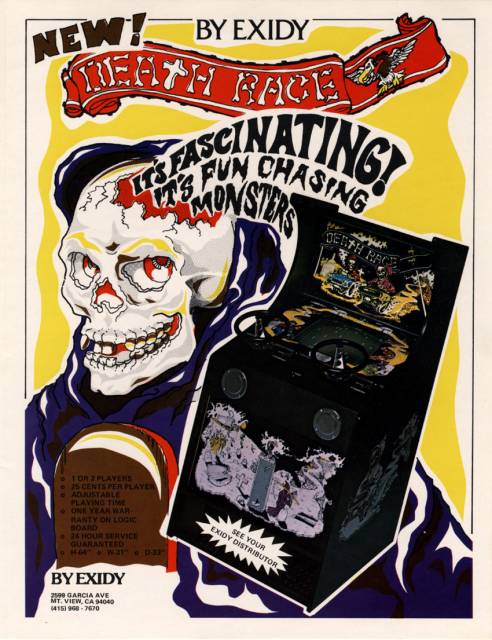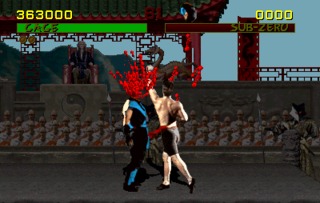Overview
 Arcade flyer for Death Race.
Arcade flyer for Death Race.Video game controversy had its beginnings in 1973 with the arcade game Gotcha. The game used two pink rubber bulges that resembled breasts which players had to squeeze to control the game. These sexual controls caused the game to be nicknamed "The Boob Game" and gave us the first example ever of video game controversy. People were infuriated by the sexual implications of the controls which related to grabbing a woman's breasts. Another early example of controversy involved the 1976 arcade game Death Race. The objective of the game was to run over gremlins with a car who, when run over, would turn into tombstones. Despite the graphic limitations at the time the game was made, which severely limited the amount and level of violent content that could be put in a video game, and the fact that it wasn't the first violent video game (preceded by Gun Fight in 1975), critics accused the game of promoting violence. The National Safety Council, for example, called the game "sick and morbid".
The first mainstream controversies, however, arose during the golden age of arcade games, from 1978 to the mid-1980s, but for different reasons, namely video game addiction and the psychological effects on youths. It began with Space Invaders, the first video game to become a mainstream worldwide success. Within a year of its 1978 release, the Japanese PTA (Parent-Teacher Association) unsuccessfully attempted to ban the game for allegedly inspiring truancy. In North America, doctors coined conditions such as the "Space Invaders elbow" and "Space Invaders wrist" as complaints. In Britain, it even attracted political controversy, when the 1981 "Control of Space Invaders (and other Electronic Games) Bill" was drafted by a Labour Party MP to ban the game for its "addictive properties" and for causing "deviancy"; a motion to bring the bill before Parliament was defeated by 114 votes to 94 votes.
Late 1980s to 1990s
 Johnny Cage decapitating Sub-Zero - an example of Mortal Kombat's extreme violence.
Johnny Cage decapitating Sub-Zero - an example of Mortal Kombat's extreme violence.The first game to be banned for sexual content was the 1986 PC-88 game 177. Decades before the controversy surrounding Rapelay, 177 was banned in Japan for involving rape. It was later re-released with sexual content removed.
The first game to become controversial for excessive violence as well as religious symbolism was Namco's 1988 arcade game Splatterhouse. Despite being the first game to come with a parental advisory warning, when Atari Games distributed the game in North America, it became controversial, not only for its excessive violence and gore, but also for its references to Christian symbols such as the cross. As a result, the game was eventually banned in the United States. Nevertheless, the TurboGrafx-16 port was released in the US, but was heavily toned down compared to the arcade original.
A few years later, similar controversy surrounding excessive violence arose with the 1992 arcade hit Mortal Kombat. Its immense popularity with the American public prevented it from being banned, but instead its home console ports led to the establishment of the ESRB ratings board.
21st century
![The infamous]() The infamous "Hot Coffee" Mod.
The infamous "Hot Coffee" Mod.The Hot Coffee Minigame was an interactive sex minigame in Grand Theft Auto: San Andreas which was released Oct. 26, 2004 and developed by Rockstar North. Despite early claims from Rockstar that it was fan-created, the minigame was indeed created by the development team, who had decided against its inclusion in the end. The minigame was disabled from the final code so that it was impossible for a player to access it by any manner, except for cheating or hacking. Despite this, the minigame was discovered and it raised a lot of controversy and ultimately the game, which was originally rated M for Mature by the ESRB, was forced to change its rating to AO (Adults Only) for content that technically was not in the retail product, revealing the unfair nature of the ESRB to the public eye. Since many retail stores do not allow the sale of AO rated games, San Andreas was pulled from many store shelves. Rockstar later released an updated version of the game with the minigame completely removed from the game's code to re-obtain its M-rating, which was necessary to keep the sales of the game up.
A few years later, controversy surrounding sexual content in video games arose once again with Rapelay, an erotic game revolving around rape. While it initially received little attention upon its 2006 release, it became controversial several years later in the Western world, despite never having been released outside of Japan. The international controversy eventually led to Rapelay being banned in Japan.
External links
Log in to comment